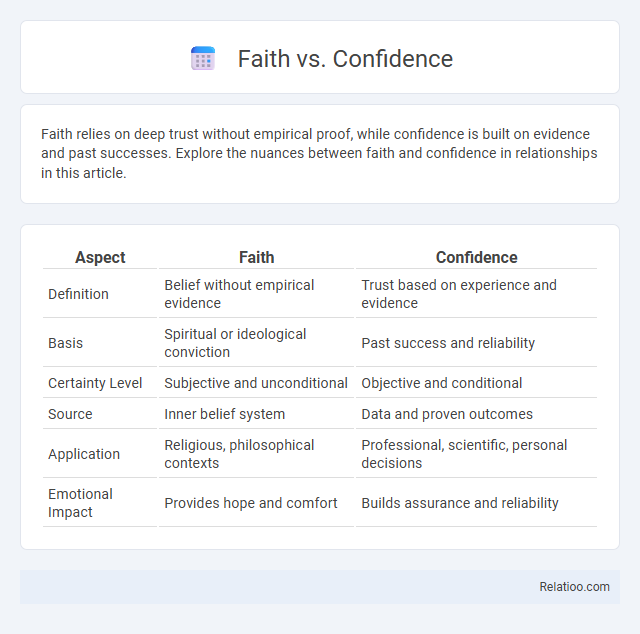Faith relies on deep trust without empirical proof, while confidence is built on evidence and past successes. Explore the nuances between faith and confidence in relationships in this article.
Table of Comparison
| Aspect | Faith | Confidence |
|---|---|---|
| Definition | Belief without empirical evidence | Trust based on experience and evidence |
| Basis | Spiritual or ideological conviction | Past success and reliability |
| Certainty Level | Subjective and unconditional | Objective and conditional |
| Source | Inner belief system | Data and proven outcomes |
| Application | Religious, philosophical contexts | Professional, scientific, personal decisions |
| Emotional Impact | Provides hope and comfort | Builds assurance and reliability |
Understanding Faith: Definition and Origins
Faith originates from ancient beliefs and is defined as a deep trust or conviction in something beyond empirical evidence, often rooted in religious or spiritual contexts. Confidence, by contrast, is the self-assurance based on personal experience, knowledge, and skills. Understanding faith helps you distinguish it from confidence by recognizing its reliance on hope and belief rather than proof or certainty.
What is Confidence? Key Characteristics
Confidence is the belief in one's abilities and judgment to achieve specific goals or perform tasks effectively. Key characteristics include self-assurance, clarity in decision-making, resilience in facing challenges, and a positive mindset rooted in past experiences and skills. Unlike faith, which is trust without empirical evidence, confidence relies on evidence, practice, and competence as its foundation.
Faith vs Confidence: Core Differences
Faith centers on belief without empirical evidence, relying on trust and conviction in the unseen or unknown, while confidence is grounded in past experiences, skills, and tangible proof of ability. Your faith often stems from spiritual or emotional assurance, providing inner peace beyond logic, whereas confidence is tied to rational assessment and predictable outcomes. Understanding these distinctions helps clarify how you approach challenges with either a hopeful mindset or a measurable expectation.
Psychological Foundations of Faith and Confidence
Faith and confidence originate from distinct psychological foundations affecting human cognition and behavior. Faith is rooted in belief systems and emotional commitment often independent of empirical evidence, engaging brain regions associated with trust and emotional regulation. Confidence arises from accumulated experiences and skill mastery, activating neural processes linked to self-efficacy and reward anticipation.
The Role of Belief in Shaping Faith
Belief serves as the foundation that shapes and defines faith, influencing your ability to trust in outcomes beyond empirical evidence. Faith transcends confidence by relying on deep conviction and spiritual assurance rather than just measurable certainty. Understanding the interplay between belief, faith, and confidence empowers you to cultivate resilience and purpose in uncertain situations.
How Experience Influences Confidence
Experience shapes your confidence by providing tangible evidence of your abilities and past successes, reinforcing trust in your skills. Unlike faith, which is belief without proof, confidence relies on accumulated knowledge and repeated practice to build certainty in outcomes. As you gain more experience, your decision-making improves, reducing doubt and enhancing your overall self-assurance.
Faith in Religion vs Confidence in Self
Faith in religion involves a profound trust in divine power and teachings, often rooted in spiritual beliefs and sacred texts. Confidence in self reflects an individual's assurance in their abilities and decisions, built through personal experience and self-awareness. While religious faith provides hope and guidance beyond tangible proof, self-confidence empowers proactive actions and personal growth based on internal validation.
The Benefits of Cultivating Faith
Cultivating faith strengthens resilience and provides a profound sense of purpose during challenging times. Unlike mere confidence, which relies on past achievements, faith offers unwavering trust in outcomes beyond current evidence. This enduring belief enhances mental well-being and fosters perseverance, leading to personal growth and fulfillment.
Building Unshakable Confidence: Proven Strategies
Building unshakable confidence requires understanding the distinct roles of faith, confidence, and belief in your personal growth. Confidence stems from consistent actions, proven strategies, and daily habits that reinforce your capabilities, while faith often involves trust in unseen outcomes beyond your control. By focusing on measurable progress and cultivating empowering mindsets, you can transform your self-assurance and maintain resilience in any challenge.
Striking a Balance: Integrating Faith and Confidence
Striking a balance between faith and confidence is essential for personal growth and resilience. Faith provides a deep-rooted belief in possibilities beyond immediate evidence, while confidence stems from trust in your skills and past successes. Integrating both empowers you to pursue goals with optimism and practical assurance, navigating challenges with a steady and hopeful mindset.

Infographic: Faith vs Confidence
 relatioo.com
relatioo.com